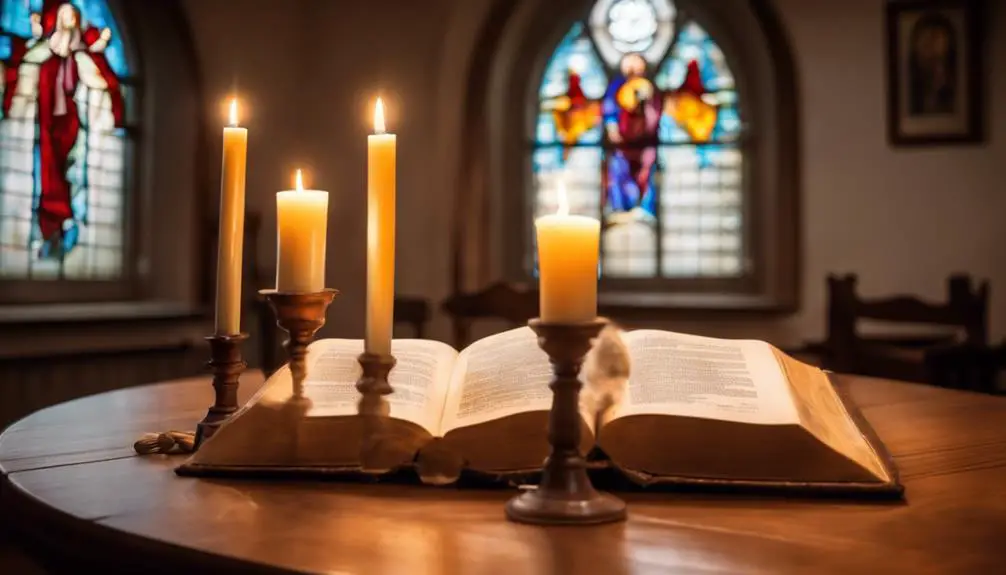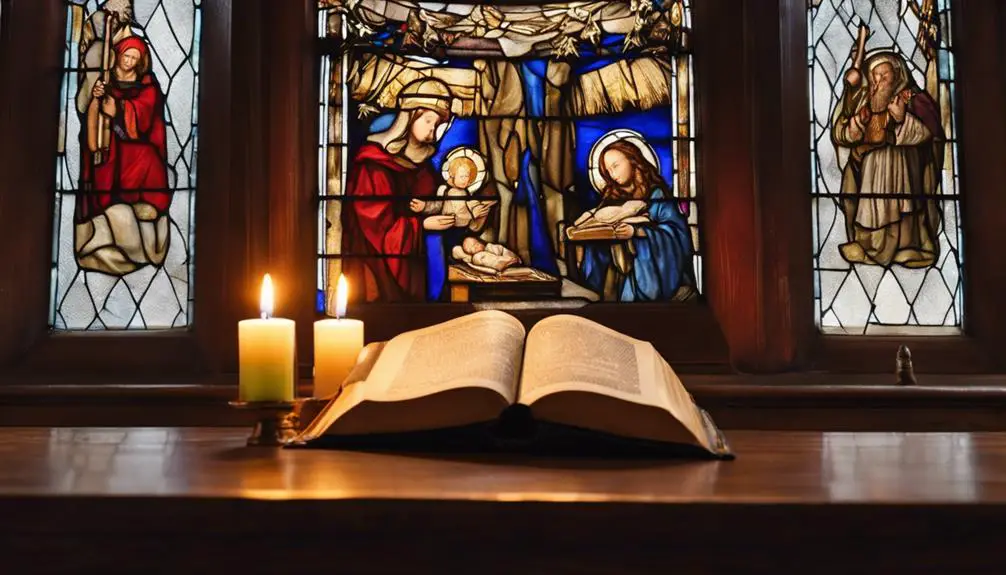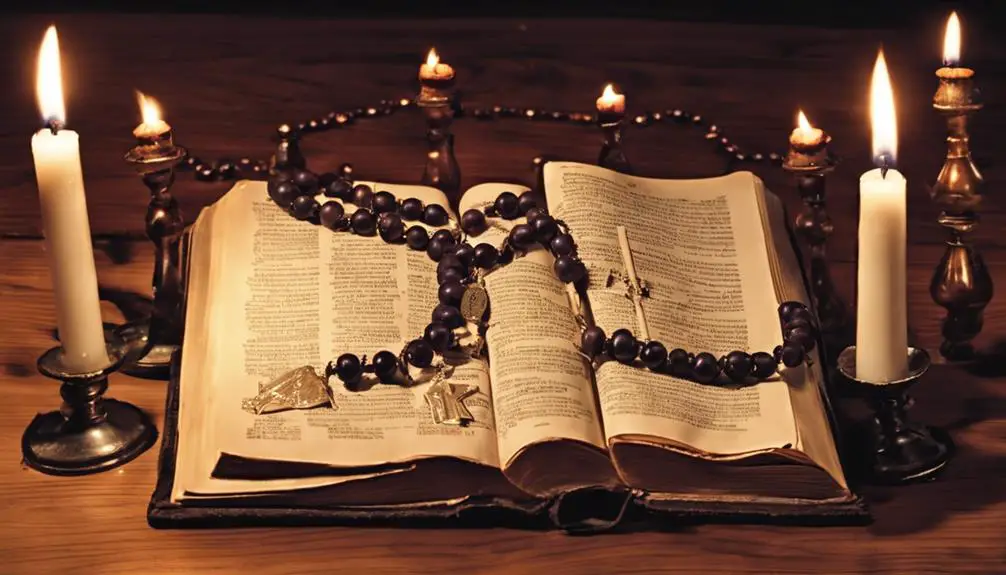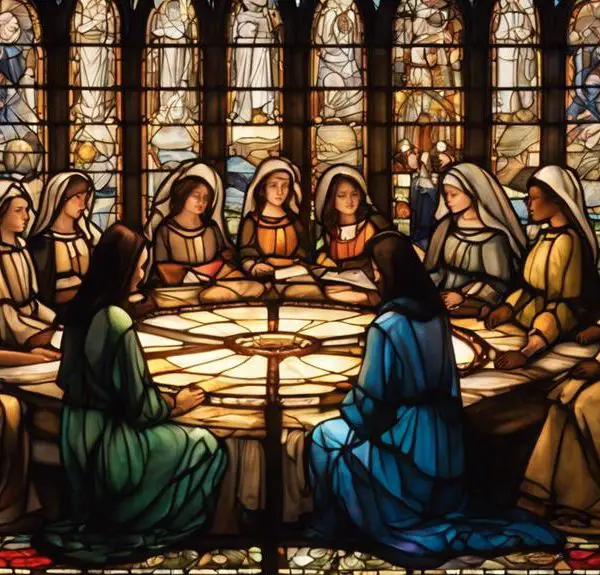Leverage the power of Advent with our insightful Catholic Bible study guide; your spiritual journey awaits.

Catholic Bible Study for Advent
Advent is the most vital season in the Catholic liturgical calendar, a time so densely packed with spiritual significance, it's like trying to sip from a firehose of divine grace.
You're about to embark on an exploration of the Catholic Bible studies specifically curated for Advent. We'll be taking a magnifying glass to the scriptures, unearthing the profound teachings related to this holy season.
We'll enlighten you on how to construct a Scripture reading plan for Advent and how to reflect and pray during this season. Intrigued? Stick around, you don't want to miss this enlightening journey.
Key Takeaways
- Advent is a significant season in Catholicism, encouraging spiritual preparation, reflection, and anticipation of Christ's birth and return.
- A Bible study during Advent should include Old Testament prophecies, New Testament fulfillment, and Psalms of hope.
- An effective Advent Bible study plan would immerse readers in scriptures like Isaiah 7:14, Jeremiah 33:14-16, and Micah 5:2-5.
- The Advent season offers an opportunity to deepen prayer life, focusing on the longing for Christ's birth and Second Coming.
Understanding the Significance of Advent

To fully appreciate the Advent season, you must first understand its profound theological significance in the Catholic tradition. It's not merely a countdown to Christmas; it's a period of spiritual preparation and anticipation, a time to reflect upon the mysteries of Incarnation and Second Coming of Christ.
In Catholic theology, Advent serves a dual purpose. Firstly, it commemorates the historical event of Jesus's birth- the Incarnation, where divinity merged with humanity in the person of Christ. It's a time to ponder on this mystery, to delve into the profound implications of God becoming man, to share in our joys, sufferings, and ultimately, our death.
Secondly, Advent is a period of eager anticipation for Christ's Second Coming at the end of time. It's an opportunity to examine your spiritual readiness, to seek reconciliation, and to rekindle your faith. In essence, Advent is a journey of hope, a season of waiting and a call to vigilance. It's a reminder that you're a pilgrim in this world, yearning for the ultimate destination- communion with God in His eternal kingdom. In this light, Advent isn't just a season; it's a state of the soul.
Biblical References to Advent

Delving into the Scriptures, you'll find numerous references that both directly and indirectly relate to the season of Advent. This period, a time of anticipation for Christ's coming, is echoed in several Old Testament texts. Isaiah 9:6, for instance, prophesies the birth of Jesus, the 'Prince of Peace'. Micah 5:2 foretells of a ruler to come from Bethlehem, further pointing to Jesus' birth.
In the New Testament, Luke 1:26-38 narrates the Annunciation, where the angel Gabriel announces Jesus' impending birth to Mary. It's a clear representation of anticipation, a key theme of Advent. Further, Matthew 24:36-44 exhorts vigilance as 'the Son of Man is coming at an unexpected hour', embodying the advent call to be watchful.
But Advent isn't just about Christ's first coming. It also anticipates His Second Coming. Revelations 22:20, where Christ promises to 'come soon', serves as a stark reminder of this future event.
Thus, Advent is deeply rooted in Scripture. It's not just a liturgical season, but a reflection of the biblical narrative of anticipation, longing, and watchfulness. These biblical references, while not exhaustively covering Advent's richness, give a glimpse into its theological underpinnings.
Catholic Teachings on Advent

In the realm of Catholic teachings, Advent holds a profoundly significant position, serving as a time of spiritual preparation where you're encouraged to renew your understanding of the Old Testament prophecies, the mystery of the Incarnation, and the anticipation of Christ's Second Coming. This four-week liturgical season, beginning on the Sunday closest to November 30 and culminating on Christmas Eve, is a period of solemn reflection, repentance, and joyful expectation.
As a Catholic, you're urged to contemplate the three comings of Christ: His historical coming in Bethlehem, His present coming through grace, and His future coming at the end of time. The church's liturgy during Advent, rich with symbolism and tradition, aids you in this meditation. The Advent wreath, with its progressive lighting of four candles, exemplifies the growing anticipation of Christ's arrival. The liturgical color purple, representing penance and preparation, underscores the season's tone.
Advent's teachings are meant not only to prepare you for Christmas but also to instill a profound sense of hope. As Pope Benedict XVI wrote, 'Advent's intention is to awaken the most profound and basic emotional memory within us, namely, the memory of the God who became a child.'
Scripture Reading Plan for Advent

Crafting a Scripture reading plan for Advent can enrich your spiritual journey, as it enables you to delve deeper into the biblical narratives that are central to this sacred season. Engaging with the Word of God in this specific liturgical context allows you to reflect upon the theological themes of expectation, preparation, and the coming of Christ.
Consider following a reading plan that includes Old Testament prophecies, New Testament fulfillment in Christ, and Psalms of hope and anticipation. These readings will not only anchor your Advent observance in scripture but will also illuminate the profound interconnectedness of the biblical narrative.
To help you structure your readings, here's a simple guide to get you started:
Week |
Scripture Readings |
|---|---|
Week 1 |
Isaiah 7:14; Psalm 80:1-7 |
Week 2 |
Jeremiah 33:14-16; Luke 1:26-38 |
Week 3 |
Micah 5:2-5; Matthew 1:18-25 |
This Advent, immerse yourself in these scriptures. Let them guide your contemplation and prepare your heart for the coming of the Lord. Remember, the practice isn't about quantity, but the depth of engagement and reflection. Allow the Holy Spirit to guide you in this sacred undertaking.
Reflecting and Praying During Advent

Beyond immersing yourself in scripture, Advent also offers a unique opportunity to deepen your spiritual journey through reflection and prayer. It's a time to contemplate the profound mystery of the Incarnation – God's self-revelation in human form – and the implications of that divine act for your own life. This introspection shouldn't be a passive practice, but rather an active engagement with the themes of hope, preparation, joy, and love that Advent encapsulates.
The practice of prayer during Advent, too, takes on a unique character. You're encouraged to adopt an attitude of watchful waiting, mirroring the spiritual anticipation of those who awaited the Messiah's birth. Your prayers should be infused with a sense of longing, not only for the celebration of Christ's birth but also for His second coming. This season, your prayer life can transform into a dynamic dialogue with God, where you express your deepest hopes, fears, and dreams, and listen attentively for His response.
Conclusion
In sum, Advent is a profound season in the Catholic faith. It's a time of anticipation, reflection, and spiritual preparation for Christ's birth.
By studying scripture related to Advent, you deepen your understanding of this holy period. Catholic teachings provide further guidance on observing Advent faithfully.
Finally, personal prayer and reflection during Advent help you connect more intimately with God, preparing your heart for the joy of Christmas.



Sign up